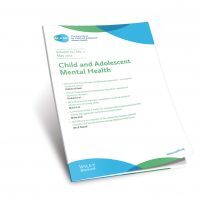ACAMH Website Content Types
-

Technology Matters: Increasing access to evidence-based treatment for child anxiety problems: online parent-led CBT for children identified via schools
Open Access paper from the CAMH journal 2023 Special Issue – “Anxiety problems are extremely common and have an early age of onset. We previously found, in a study in England, that fewer than 3% of children with an anxiety disorder identified in the community had accessed an evidence-based treatment (Cognitive Behavioural Therapy; CBT)”. Iheoma Green (pic) et al.
Read more -

Associations between emotion recognition and autistic and callous-unemotional traits: differential effects of cueing to the eyes
Open Access paper from the JCPP – We tested whether cueing to the eyes improved emotion recognition in relation to autistic and CU traits in a heterogeneous sample of children enhanced for social, emotional and behavioural difficulties. Virginia Carter Leno et al.
Read more -

Annual Research Review: Stability of psychopathology: lessons learned from longitudinal population survey
Open Access paper from the JCPP – “Psychopathology has been long recognized as a fluctuating process with various expressions over time, which can only be properly understood if we follow individuals and their social context from childhood up until adulthood”. Albertine J. Oldehinkel (pic) and Johan Ormel
Read more -

Review: Interventions addressing loneliness amongst university students: a systematic review
Open Access paper from the CAMH journal – “Loneliness is detrimental to mental health, with university students at higher risk of feeling lonely than other population groups”. Olivia Betty Ellard et al.
Read more -

Schools engaged in doom-monitoring students’ online interactions and content creation: an analysis of dominant media discourses
Paper from the CAMH journal 2023 Special Issue – “Growing public concern about the safety and security of schools has led many schools and school districts within the United States to hire private companies to monitor students’ online interactions and the content they create, including on social media”. Kristjan Kikerpill and Andra Siibak
Read more -

2022 Top 10 Downloaded Journal Papers
The results are in, and in recognition of the success of our three journals, the JCPP, the CAMH and JCPP Advances, we are proud to present the top 10 most downloaded papers for each journal, published in 2022.
Read more -

Review: Digital experiences and their impact on the lives of adolescents with pre-existing anxiety, depression, eating and nonsuicidal self-injury conditions – a systematic review
Open Access paper from the CAMH journal 2023 Special Issue – “We review publications relating to anxiety, depression, eating disorders and nonsuicidal self-injury to identify common and condition-specific digital experiences and how these may be implicated in the origins and maintenance of these mental health conditions”. Katarzyna Kostyrka-Allchorne (pic) et al.
Read more -

Using machine-learning methods to identify early-life predictors of 11-year language outcome
Open Access paper from the JCPP – “This study aims to identify a parsimonious set of preschool indicators that predict language outcomes in late childhood, using data from the population-based Early Language in Victoria Study (n = 839)”. Loretta Gasparini et al.
Read more -

Prospective prediction of developing internalizing disorders in ADHD
Open Access paper from the JCPP – “Clinical course in attention-deficit/hyperactivity disorder (ADHD) is highly heterogeneous with respect to both core symptoms and associated features and impairment”. Sarah L. Karalunas (pic) et al.
Read more -

Internet based intervention (Emotion Regulation Individual Therapy for Adolescents) as add-on to treatment as usual versus treatment as usual for non-suicidal self-injury in adolescent outpatients: The TEENS randomised feasibility trial
Open Access paper from JCPP Advances – “We assessed the feasibility of Internet based Emotion Regulation Individual Therapy for Adolescents (ERITA) in psychiatric outpatients aged 13–17 years who engaged in NSSI”. Britt Morthorst et al.
Read more